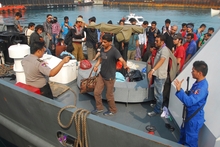Getting tough is not the answer: Australia and NZ must work with Asian nations to help, writes Grant Bayldon.
The Asia Pacific region is probably the worst part of the world to be a refugee in. Not only does it have more refugees, it has less protection for them than anywhere else in the world.
This month while in Thailand, I visited Rohingya women and children who had fled from appalling atrocities in Burma. I should be used to hearing such stories by now, working for Amnesty International, but the stories are always so far removed from my life in New Zealand that I don't think I ever will be.
These women had been so desperate to escape that they had fled to Thailand, a terrifying three-week journey in a small open fishing boat packed with 100 people. Some were pregnant - one delivered her baby on the boat. All had terrible stories: houses burnt, family members killed.
The Rohingya are a Muslim minority group in Burma who for centuries have faced severe discrimination, and are denied equal access to citizenship in their own country.
Now in Thailand, the women and children have some room to move around, but their husbands have been caged like animals in a separate detention centre where shocking conditions are standing room only - a desperate mix of disease and depression.
In some ways these are the lucky ones. It's believed that many other Rohingya fleeing Burma by boat over the past year have fallen into the hands of human traffickers who have sold them to become what amounts to slave labourers on fishing boats or into the sex industry.
Some have allegedly been towed out to sea by the Thai Navy, stripped of fuel and supplies and left to die.
For those who've made it to Thailand and other countries, their problem is that - like most countries in the region - Thailand isn't a signatory to the Refugee Convention, and therefore asylum seekers have no guarantee of protection.
What's worse is that Thailand even refuses to allow the United Nations to register the Rohingya for the UN refugee resettlement programme. But even if they did, places are scarce.
In Thailand, as in most other countries, they are simply illegal migrants liable to fall prey to human traffickers or indefinite detention.
It's no wonder so many people are trying to get on boats to Australia.
But in Australia the issue has become what humanitarian issues should never be - a political football kicked around by politicians desperate to win an election. On Friday the Australian Government announced it will now refuse to resettle asylum seekers who arrive by boat. Instead they will be permanently deported to Papua New Guinea.
But if you've been listening to the political debate in Australia, everything you've heard is probably wrong. Prime Minister Kevin Rudd paints the arrivals as a catastrophe engulfing Australia. The Leader of the Opposition Tony Abbott claims most are economic migrants seeking a better standard of living.
At first Rudd seems right. The numbers are significant, with almost 16,000 arriving so far this year. Until you look at it as a proportion of Australia's total annual migrant immigration, which brings in an additional 185,000 new Australians each year.
And Abbott's claim that most are not genuine refugees? As you'd probably guess, it's not easy to meet the requirements of being a refugee. Poverty won't get you there, you must prove that you are genuinely fleeing human rights abuses or war. But more than 90 per cent of arrivals in Australia are found to be exactly that: genuine refugees.
Then there's the deterrent claim - that tough policies are necessary to stop people dying at sea. Australia set up the offshore processing solution to achieve this, and New Zealand even had a go with our recent legislation to allow for mass detention of asylum seekers.
But the get-tough approach of making asylum seekers wait for years in inhumane conditions in Nauru and on Manus Island didn't work. They kept coming. The biggest group arriving in Australia are Afghanis, mostly the Hazara ethnic group so dreadfully persecuted by the Taliban. Could Australia or New Zealand's policies ever be so terrifying that they'd rather stay and face the Taliban?
The real tragedy is that the Australian move to send the problem on to Papua New Guinea, and the recent legislation change in New Zealand, diminishes what moral legitimacy we have to play the role of respected brokers in the region.
Because what's needed is not more failed get-tough policies, but to work with the receiving countries like Thailand, Malaysia and Indonesia to increase recognition and support for refugees so they don't have to get on boats. We need to create opportunities for the most vulnerable people to be settled right across the region.
That's the role Australia and New Zealand need to play - to be leaders in the region, doing their bit and working with other countries to help them do theirs. Not playing pass the parcel.
Grant Bayldon is Amnesty International's New Zealand executive director.
By Grant Bayldon

No comments:
Post a Comment